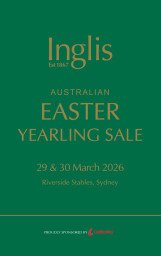8th Apr 2009

The Australian - Scott Murdoch - Wednesday, 8 April 2009
YOUR share portfolio is in tatters, you can't offload your investment property in a tumbling market and don't mention the state of your super. Now the most enjoyable and distracting part of your investment portfolio, your stake in a stable of thoroughbreds, is in the doldrums.
It already has been called the "rich recession". But as wealth is eroded across the world and financial markets remain stuck in disarray, the blue-blood thoroughbred industry cannot escape the pain of the global financial crisis.
This week, the industry's leading players from Australia and overseas gathered at Randwick, the home of racing in Sydney, with the hope of finding the sport's next champion. More than 500 yearlings have gone under the hammer at the Inglis Easter yearling sales as fresh blood is injected into the industry.
The sales are considered a barometer for the bloodstock and thoroughbred industry and if the results are the best guide, the industry is feeling the pinch. The action began on Sunday - which normally has the best horses - when 180 yearlings were sold. There was demand, but prices were well down from last year and followed overseas trends.
The international yearling season begins with Keeneland's in the US in September, followed by the British Tattersalls sale and Goffs Bloodstock in Ireland. Each recorded prices down 30 per cent. Australia is the same.
In the first crop of Sydney yearlings, prices were down by 25 per cent and the million-dollar price tags that had been a feature headline of the past did not eventuate.
In April last year, before the worst of the financial crisis emerged, more than 20 horses sold for more than $1 million, but this year only six passed that mark. The average price last year was $338,737; this year that fell to $244,000, a 28 per cent decline.
Inglis deputy chairman Arthur Inglis believes racehorses are no different from stocks and shares when some investors look at their individual portfolios.
"It could be the case that in the past they may have bought five horses, but instead now they will buy one," he says. "There are investor buyers, a number of participants who like to race and then breed a horse, and there can be a significant return. A lot of people have investment portfolios and horses can make up a part of that."
Several observers noted the lack of Asian buyers, normally keen investors of Australian bloodstock, although a Japanese buyer paid $850,000 for a bay colt with the breeding of a champion, by super-sire Redoute's Choice out of VRC Oaks winner Hollow Bullet. Many believe the horse would have fetched $1.2 million last year. A filly sired by Redoute's Choice was bought for $240,000 by Scott Perrin, brother of bankrupt former Billabong boss Matthew Perrin.
The drawcard of the sale, the first foal from champion mare and three-time Melbourne Cup winner Makybe Diva, was bought by trainer Danny O'Brien for $1.5 million. Despite the size of the outlay, the consensus is that "Rockstar" - nicknamed for his handsome looks, striking markings and prize pedigree - was sold cheaply.
The sales topper was an Encosta De Lago colt that went for $1.8 million to an unnamed buyer. But many good judges reckon that last year Rockstar would have attracted bids over the $3 million mark.
Champion trainer Bart Cummings thinks the racing industry has been slow to react to the ever-changing world conditions and the sport will start to feel the pinch. He knows how hard it is to survive an economic downturn. In the late 1980s his business and racing empire crumbled after paying top dollar for young horses in the Cups King Syndicate. But now the spritely 81-year-old is back on top and won last year's Melbourne Cup with Viewed. When he speaks, the industry listens.
Cummings believes changes have to be made on the service fees for stallions, which go above $300,000 for top horses such as Redoute's Choice and Encosta De Lago. Those prices are unrealistic, he says.
"The easiest thing to highlight the conditions are the pass-in rates at this sale," Cummings says. "The breeders selling the yearlings in this auction, their expectations are similar to last year but there is a recession. The service fees need to be drastically reduced to justify the risk."
Cummings trains out of his Randwick headquarters and says the demand for owners to become involved is still high. Some fear that new investors will be hard to find.
Champion trainer Gai Waterhouse, a traditional big spender at the Australian sales, says the industry has not escaped fallout from the global recession but is holding up well.
"On the whole there are a lot of new investors," Waterhouse says, referring to her own ownership demographic. "One sector of the market has gone and those are the share-market investors."
A renowned marketing machine, Waterhouse must find buyers for the $1.6million worth of horseflesh she has bought in the sales ring. Her website is already advertising stakes of up to 80 per cent, with a particular emphasis on her $850,000 purchase of a Redoute's Choice colt out of Gypsy Dancer. That colt is a half-brother to Waterhouse's former spring sensation Dance Hero, which won the Sydney Triple Crown that started with victory in the 2004 Golden Slipper. In his career Dance Hero amassed winnings of $3.9 million and, given that pedigree, many thought his younger brother this year would have been worth at least $1.2 million.
As global economic conditions remain fraught, there are questions about how the industry will adapt. The signs are not positive. As unemployment is forecast to rise to 10 per cent, meaning that more than one million people will be without a job, spending on racing is bound to suffer. Australians spend more than $17.5 billion a year on gaming.
That figure equates to $1123 a person and racing takes up the second largest proportion of that, with about $148 spent per capita. The racing industry is worth $6.3 billion a year, forecast to fall as the economy slows.
Melbourne trainer Lee Freedman was ringside at the start of the sales and says the signs of poor global conditions are evident in racing. "Breeders are going to take a hit, but I think people are realistic. People are very selective in tough times, they will consider their best interests. If you look at it as investment, broodmares are certainly a good asset, but a racehorse, unless it's top class, is a luxury item."
One of the nation's best-known bookmakers, Rob Waterhouse, husband of Gai, has not noticed any slowdown in the turnover of his business, which is based on a business model different from most of his rivals.
Rob Waterhouse runs a primarily wholesale-type model that caters to corporate bookmakers who use his services almost as a hedging strategy to offset their risk. His son, Tom, operates a more retail-style operation out of Melbourne, where he bets with normal punters. Both businesses, Rob Waterhouse says, have not seen much of an adverse effect.
"Australia has three economies at the moment. There's the financial economy, which is in decline, the mining economy is finding very difficult, but the rest of the economy is doing OK," he says.
"I have spoken to a lot of people in the service economy, people running hotels, and they say it's the best ever. A real estate agent in the eastern suburbs (of Sydney) told me (they) have had a boom. My business has not had any change at all. Gai and I were just in Europe and people are shocked there, they are quite worried. But there seems to be a different atmosphere here."
Peter Wynne, a Sydney publican who owns Icon Hospitality, is also a breeder of racehorses and shares Cummings's opinion that if the industry is to adapt, it has to start with the breeding industry. So far there is little evidence that this change has begun.
"The industry is about racing. If they want new people to race horses, than you have to be able to breed them at realistic prices," Wynne says. "If the service fees were realistic, then you would sell them at realistic price. I think we are in for a tough couple of years because I can't see very many new participants. I think it's the same as many industries now, there needs to be a reality check and I think that is starting for racing."
The sire Redoute's Choice commands the highest service fee in Australia, at $330,000. His main rival, Encosta De Lago, stands for $302,500, but both horses had yearlings that sold for well below that mark. One of the Redoute's horses sold for $140,000, meaning an immediate loss for investors.
Widden Stud manager Antony Thompson, who is also chairman of industry advocate Aushorse, says people in breeding are aware prices will be well down from the peak of the economic cycle.
"The general attitude from breeders is a long-term view that people breed horses for several reasons and we will sell them well in the good times," he says.
"In the bad times we are price takers. The industry will move in line with the rest of the economy and will (be) following the share-market movements.
"The one thing the Australian industry has done recently is to become more of an international commodity and the international market is very important. The Australian bloodstock is a good export market and there is good international money here."
But aside from the financial concerns and the business future of racing, there are participants who are in it for the love of the sport. Ebullient business figure John Symonds, executive chairman of Aussie Home Loans, fits into that category with his ownership of broodmares, yearlings and six racehorses in work. But, he admits, racing can be a game that exists more for love than for making money.
"It's a lottery ticket. Most people who put money into racing lose it," Symonds says. "There is a lot of risk ... there are extreme highs and extreme lows, probably more lows than highs. But that can be the cost of fun."
-thumb.jpg)
8, 9, 10 February 2026
-thumb.jpg)
1, 2, 3 March 2026

29, 30 March 2026

30 January - 4 February 2026

30 January - 4 February 2026

19 April 2026